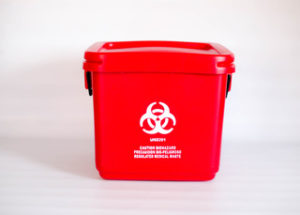The Relevance of Appropriate Waste Disposal Practices
The administration of waste is an important element of ecological stewardship that typically goes undetected in our every day lives. Correct waste disposal practices are not just a matter of ease yet are essential for guarding our ecosystems and public wellness. From the repercussions of improper waste disposal on our atmosphere to the long-lasting implications for future generations, the significance of taking on sustainable waste monitoring techniques can not be overstated. By discovering the ecological influence of reckless waste disposal, the advantages of recycling initiatives, and the significance of area engagement in waste reduction initiatives, a much deeper understanding of why proper waste disposal practices are vital emerges.
Environmental Effect of Improper Disposal
Incorrect disposal of waste postures a significant hazard to the setting due to its detrimental results on ecosystems and human health and wellness. When waste is not appropriately handled, it can bring about air pollution of the air, dirt, and water, triggering injury to various plant and pet species. click here. Chemicals and contaminants from improperly disposed waste can permeate into the ground, infecting groundwater sources and impacting the health of both wild animals and humans
Additionally, the accumulation of waste in land fills produces greenhouse gases like methane, adding to climate adjustment and worldwide warming. Inappropriate disposal methods additionally cause littering, which not only degrades the visual worth of the environment yet can likewise damage wild animals with consumption or entanglement.
To mitigate these environmental influences, it is critical for individuals and areas to take on correct garbage disposal techniques such as reusing, composting, and liable harmful waste disposal. By taking these steps, we can aid secure ecosystems, preserve natural deposits, and safeguard human health and wellness for existing and future generations.
Benefits of Recycling Programs
Routinely taking part in reusing programs supplies many benefits for both the setting and culture as a whole. This preservation of sources not only helps in maintaining environmental balance however likewise adds to sustainable advancement.
Moreover, recycling plays a crucial duty in lowering energy intake and greenhouse gas emissions. The production of goods from recycled products usually calls for less energy compared to manufacturing from virgin resources - medical waste removal. Because of this, the carbon impact related to the production process is dramatically decreased, assisting in the battle against environment change
Additionally, reusing programs produce work opportunities in the reusing industry, advertising financial growth and social well-being. By encouraging the recycling and reuse of materials, these programs support a circular economic climate that decreases waste generation and optimizes resource efficiency, eventually causing a cleaner, greener future for generations ahead.
Hazardous Waste Management Standards
Executing efficient hazardous waste management standards is critical for lessening environmental and health threats related to the improper disposal of dangerous materials - click here. Proper handling, treatment, and disposal of contaminated materials are essential to prevent contamination of dirt, water resources, and air
One trick standard is proper labeling of dangerous waste containers to make sure risk-free handling and transport. Furthermore, centers must stick to strict storage requirements to stop leaks, spills, or crashes that can endanger human wellness and the environment. Regular training site link programs for staff members on unsafe waste administration methods are likewise important to ensure compliance with policies and promote a culture of safety.
Additionally, contaminated materials ought to be segregated based on its properties to avoid chemical responses that can lead to dangerous scenarios. Carrying out a thorough waste monitoring system can aid monitor the movement of hazardous products from generation to disposal, guaranteeing transparency and liability. By complying with these guidelines vigilantly, companies and sectors can add to a more secure and cleaner setting for present and future generations.
Neighborhood Involvement in Waste Decrease
To effectively deal with the environmental and health and wellness risks connected with contaminated materials monitoring, involving the area in waste reduction campaigns is extremely important. Community involvement plays a crucial function in advertising sustainable waste administration practices and cultivating a society of ecological duty. By educating residents concerning correct waste partition, reusing, and composting methods, neighborhoods can significantly decrease the amount of waste sent out to land fills, therefore decreasing ecological air pollution and conserving natural deposits.
Area engagement in waste reduction programs also helps in raising understanding regarding the relevance of waste reduction and motivates individuals to adopt environmentally friendly practices in their lives - medical waste removal near me. Joint initiatives between regional authorities, waste administration companies, and area members can result in the execution of reliable waste decrease methods tailored to the particular needs of each community or community
Furthermore, neighborhood involvement cultivates a sense of ownership and accountability among citizens, encouraging them to take proactive steps towards lowering waste generation and promoting a cleaner, healthier environment for existing and future generations. By working together in the direction of typical waste reduction goals, areas can make a substantial influence on alleviating the damaging results of incorrect garbage disposal practices.

Future of Sustainable Waste Practices
The evolution of sustainable waste methods is essential for progressing ecological stewardship and resource conservation in the coming years. As the international populace proceeds to grow, so does the amount of waste created (medical waste removal service). Traditional garbage disposal techniques, such as landfilling and incineration, are no longer sustainable in the lengthy term as a result of their substantial ecological influences. Relocating ahead, the future of lasting waste techniques depends on welcoming a round economic climate strategy, where sources are recycled, reused, or repurposed to reduce waste generation.
Technical technologies play a key function fit the future of sustainable waste practices. Advanced waste sorting and reusing modern technologies can aid enhance the effectiveness of waste management processes, enabling for the recuperation of useful resources from waste streams. In addition, the adoption of biodegradable products and composting methods can assist lower the amount of organic waste winding up in garbage dumps, consequently minimizing greenhouse gas exhausts.
Additionally, promoting customer recognition and education on proper waste partition and disposal practices is vital for driving behavior adjustment in the direction of sustainability. By fostering a society of waste reduction, recycling, and reuse, communities can collectively add to a cleaner and much healthier environment for future generations.

Verdict
To conclude, proper garbage disposal practices are important for decreasing environmental influence and advertising sustainability. By implementing recycling programs, managing hazardous waste properly, and encouraging neighborhood involvement in waste decrease initiatives, we can work towards a cleaner and healthier setting. It is essential for people, businesses, and governments to focus on lasting waste practices for the future wellness of our world.

From the repercussions of improper waste disposal on our atmosphere to the long-term ramifications for future generations, the relevance of taking on sustainable waste monitoring methods can not be overemphasized. By checking out the environmental influence of reckless waste disposal, the advantages of recycling initiatives, and the relevance of community interaction in waste decrease efforts, a much deeper understanding of why correct waste disposal techniques are important arises.
By enlightening citizens regarding correct waste segregation, reusing, and composting techniques, communities can substantially decrease the quantity of waste sent to land fills, thus lessening environmental pollution and conserving all-natural resources. (click here)
Moving ahead, the future of lasting waste techniques lies in welcoming a circular economic climate technique, where resources are reused, recycled, or repurposed to reduce waste generation.
Advanced waste sorting and reusing modern technologies can help improve the effectiveness of waste administration processes, allowing for the recovery of useful sources from waste streams.